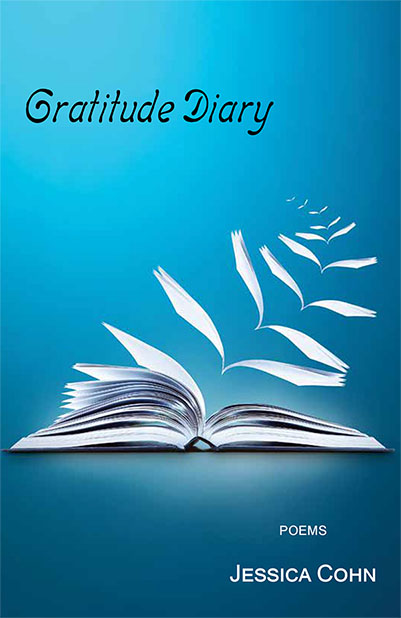Gratitude Diary
poems by
Jessica Cohn
~88 pages, $15 (+ shipping)
Release Date: August 26, 2024
The Advance Sale Discount price on this title has expired. For those who prefer to pay by check, the price is now $20/book (which includes shipping & sales tax) and should be sent to: Main Street Rag, 4416 Shea Lane, Mint Hill, NC 28227. Bookstore orders need to contact us at: EditorMSR@outlook.com
PLEASE NOTE: Ordering in advance of the release date entitles the buyer to a discount. It does not mean the book will ship before the date posted above and the price only applies to copies ordered through the Main Street Rag Online Bookstore.
 In addition to her poems, Jessica Cohn has written nonfiction books, children’s fiction, news, features, and advertising. Most of her career has focused on educational publishing, a path she followed after serving as editor of the literary magazine for Weekly Reader Publications. A Michigan native, Cohn has made homes in Illinois, New York, and most recently, California, where she’s centered on her poetry practice with the support of the Santa Cruz community of writers. She revels in the way poems say what cannot otherwise be said. For more, visit jessicacohn.net
In addition to her poems, Jessica Cohn has written nonfiction books, children’s fiction, news, features, and advertising. Most of her career has focused on educational publishing, a path she followed after serving as editor of the literary magazine for Weekly Reader Publications. A Michigan native, Cohn has made homes in Illinois, New York, and most recently, California, where she’s centered on her poetry practice with the support of the Santa Cruz community of writers. She revels in the way poems say what cannot otherwise be said. For more, visit jessicacohn.net
Gratitude Diary delivers acute observations rife with gorgeous language and imagery. It shows us how to be alive to ourselves and to nature, to consider the “incense of losses” or “a summer sky in lists of lavender offerings.” It skims subtle truths: “A woman could forget herself, / staring at pomegranate in the produce section.” If you have never fallen in love with poetry, felt it in the depth of your soul, this book will change that! ~Fran Sanders, Director, Public Poetry
Jessica Cohn’s Gratitude Diary makes the ordinary seem extraordinary, blending the everyday with the universal and symbolic. Mundane objects and daily rituals take on a pronounced existence as she looks at life in fresh original ways. Birds quickly flit in out of her poems as they visit her consciousness. We hear the ticking clock of life along with the crack, taste and smell of existence in full colors and chorus. It’s a song of gratitude. ~Lisa Ledin, Public Radio Host and Producer
“What describes what I can’t say?” the speaker asks in this, Jessica Cohn’s stunning debut poetry collection, Gratitude Diary. There are no false starts. Instead, poem after striking poem demonstrates Cohn’s unique capacity to capture in deliciously distinct language and metaphor those very human longings, pleasures, and griefs that comprise a life but often lie beyond words. Over and over, she turns her pen toward gratitude in spite of the sorrows, a practice that involves naming them, whether past wounds, ecological die-offs, the unfathomable loss of life from Covid, or the lingering loss of a family dog— “There are not enough verbs for grief.” But Cohn’s project is gratitude, and Gratitude Diary, like a poet’s breviary, makes its way through dark hours in poems that are satisfying, that brim with learned wisdom and “all the fern-edged beauty of the world.” ~Sally Ashton, author of Listening to Mars.
Here, in
the Holocene Epoch of the
Quaternary Period of the
Cenozoic Era of the
Phanerozoic Eon,
the rocks of Lake Superior still
line my dreams, greens so startling
and particular,
stones skinned smooth
under the balls of the feet, their
round insistence,
like Earth itself.
To balance, you become fin and oar,
feet colored by refractions and slime.
Your need to stop from
slipping off,
every instinct.
On family pilgrimages, no one ever said,
Be careful, now.
It wasn’t our way.
The deep water held their faces
still, peering back into the scar
that is
the big lake of first breath,
the grounding, the place
where long before, or now,
the hot plume roared,
Hold arms out this way, Turtle.
Hold arms this way.
There are not enough verbs for the griefs.
Mother is sad. Her past,
a vast cup of broken islands. Sometimes,
you leave home for harder arrangements.
You strike the anvil.
You become the anvil.
You become the rift.
Evidence
In a lab in Las Cruces, a lineup of small carcasses—
swallows, warblers, flycatchers, nares emptied
of wind, bodies stiffened. I want to stroke each lice-bitten
belly. Sweet little sisters, dying by thousands
in the Southwest. It’s strange, how many nose-dive.
Stranger, how many congregate on ground before they die.
They usually rest in trees. To the far north, another
year of wrecks. Dead murres, northern fulmars, lined up
as evidence. We’ve had years to read these signs.
Here at the foggy drop-off of California, seabirds
feast on anchovies in the bay. Sooty shearwaters
come and go in summer, except that August
when unthinkable thousands hailed down in porous hours.
In after-night. The before-morning. Thumped on rooftops.
Piled by mailboxes. Who could auger such a thing?
I don’t know much and we live in a still-dumb age.
Birds follow some unseen arc of air, rivers of
recognition set deep in the freaky avian hippocampus.
Ours, wormlike, dug in above the ear. Mine,
no doubt damaged. To get anywhere I know
only to look for landmarks. The yellow house.
Blue post box. Grove of eucalyptus. Oh, we know some
of how birds feel. The warmth of a coddle. Unease under a
watchful eye. But how birds think or what’s in birdsong—
The deer at roadside wait to chew our bones, as do
housecats. But the birds, bobbing in gutters, twitching
on fence posts. Who can read their inscrutable skies?
All the Rooms
When the furnace kicks on, the rattling
is comfort. Everyone we know,
a necklace of bones to wear when they go.
Somewhere a child reads words the first time,
feels the world reshape to unfolded sounds,
powers found in thick type on the page.
Do you remember? A first look at a metropolis
you didn’t know existed—
Our grievances, the same and the same,
all the rooms, absorbed. The afterbirth, so
bloody. Mucus slides the huddled bird,
brain bump, flailing appendages out into light.
The small, wrinkled body fills out, wears,
and wrinkles. But after battened breath,
after appetites, I do not know.
Some of us need to write an ending.
But most need is fiction. Isn’t it?
There’s hunger. Thirst. But even those
lie to us. Scratching, now there’s living.
Nails digging under thick scars. In Mexico
last spring we saw Death on stilts.
She wore a fancy dress, big hat in a Mardi
Gras parade. She danced at the front of the line.
Sometimes, three days pass, and it’s like
hearing good-bye through a tunnel of damp
green tiles. There’s a bicycle horn, and you fear
for the rider because the cars go fast.
I do not know which doors, which rooms,
but do know mourning. What we feel is never
generous enough. Grief, never finished.
Spring
It was the spring when dry goods
held our fascination. We bottled gold
hand-pumped mucus. Toilet paper
became currency. The cut of ethyl
alcohol sharpened elbows. We took
our contact in fluid ounces, returned
to fire escapes, back steps, the opposite
side of the street. The public square
emptied, and the crosswalk followed.
Masters of airports called the airplanes
home. The cars stopped moving from
their spaces along side streets. Certain
mornings, a bird might appear, its soft
tweeting out of place. A day would pass,
its tally of losses. People died. First, in
abstraction and then a name we knew.
And the geography of the world came
into focus. There was a fat man in charge,
or so they said, and he named the virus
China. But the tankers and the cargo
ships and the thin layer of hyperclean
water under every screen called it home.
Some of us bought bullets. Some of us
bought stock, trading on the corpses
and their deep pockets. But there
were many more who saw beauty in far-
sighted blue sea hemming in our patchwork
boundaries. It was the spring when hope was
a shell game. And there were winners even then.


 In addition to her poems, Jessica Cohn has written nonfiction books, children’s fiction, news, features, and advertising. Most of her career has focused on educational publishing, a path she followed after serving as editor of the literary magazine for Weekly Reader Publications. A Michigan native, Cohn has made homes in Illinois, New York, and most recently, California, where she’s centered on her poetry practice with the support of the Santa Cruz community of writers. She revels in the way poems say what cannot otherwise be said. For more, visit jessicacohn.net
In addition to her poems, Jessica Cohn has written nonfiction books, children’s fiction, news, features, and advertising. Most of her career has focused on educational publishing, a path she followed after serving as editor of the literary magazine for Weekly Reader Publications. A Michigan native, Cohn has made homes in Illinois, New York, and most recently, California, where she’s centered on her poetry practice with the support of the Santa Cruz community of writers. She revels in the way poems say what cannot otherwise be said. For more, visit jessicacohn.net